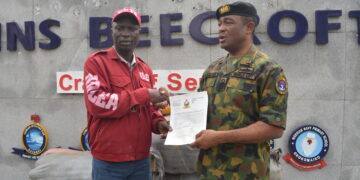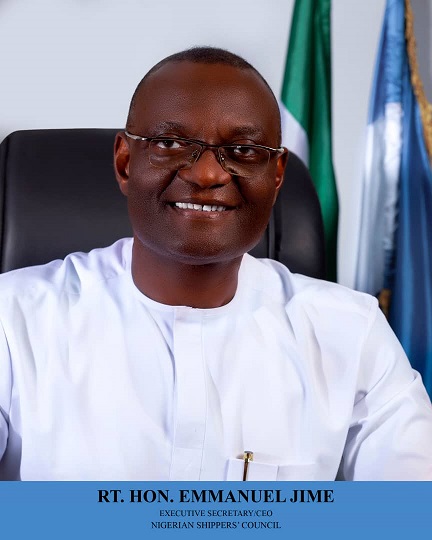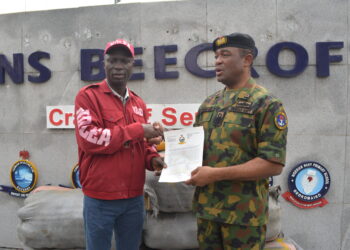Marking the World Maritime Day (WMD) 2022, which is being commemorated globally, the Federal Government said that partnerships in target relevant actions between industry operators and government would drive a greener and more sustainable maritime industry.
The Hon. Minister of Transportation, Mu’Azu Jaji Sambo, made this known on Thursday in Lagos, while delivering his keynote address at the event themed “New Technologies for Greener Shipping.”
Speaking, the Minister said: “A greener and sustainable maritime industry is achievable if we work together in partnerships and with a determination to achieve synergy in the formulation and implementation of our roadmap for the maritime sector in Nigeria and globally.”
He draw attention to the fact that even the International Maritime Organisation(IMO) had also identified the gains in partnerships to achieve the desired greener future for the maritime industry through shared information, awareness creation and training.
His words: “IMO’s identification of partnerships and information sharing on best practices as well as unfettered access to resources as being critical to the transition of the maritime sector into a greener and more sustainable sector is not by coincidence.
“This partnership must be cultivated globally and nationally. For us as a nation, the entire maritime community has a role to play in bringing about a greener and sustainable maritime industry in the areas of resource mobilization, maritime training, awareness, job creation and full implementation of maritime laws and regulations.”
Sambo also noted that the effects of Covid-19 on economies across the world made it more demanding for countries to invest heavily in technology and innovation in the maritime industry.
In that vein, he called on the maritime training institutions to ensure they revise their curricula to cover areas that would improve the seafarers’ competencies while they remain relevant to the industry in the future.
“We all need to recognise our commitment to greener future in the maritime industry. It comes with the responsibility to train and retrain our workforce in order to prepare them for the inevitable innovation and transformations of the future that will certainly impact jobs and skills. As a country, we must not lose out in the future race which will require a workforce of new skills and competencies.
“Our maritime institutions, particularly the Maritime Academy of Nigeria, Oron, and the Nigerian Institute of Transport Technology (NITT) must therefore begin to re-calibrate the curricula to begin to address these requirements of the future,” the Minister said.
In his own remark, the Minister of State for Transportation, Prince Ademola Adegoroye said the industry’s role in ensuring reduction in Green House Gas should actually hinge on the leadership patterns of the IMO.
“Recognizing the potential of reducing green House Gas emission in the shipping industry and its impact on climate change, the sector plays a critical role in ensuring sustainability through the innovative leadership of the International Maritime Organization (IMO),” Adegoroye said.
Speaking on the importance of partnerships and other factors, Adegoroye added: “To attain the “Greener shipping” we seek, it is imperative that new technologies must be embraced through aggressive technology transfer, research and development, innovation and partnership.”
In his message, Dr. Bashir Jamoh, the Director General, Nigerian Maritime Administration and Safety Agency (NIMASA), reiterated his agency’s commitment to safe, secure, and sustainable shipping, cleaner oceans, and enhanced maritime capacity in line with the best global practices.
He said it was time for multi -stakeholder cooperation to tackle climate change and its impacts, as climate change is one of the biggest challenges facing the world today.
His words: “NIMASA is fully committed to tackling shipping’s contribution to climate change in line with the Nigeria’s Climate Change policy and IMO Greenhouse Gas strategy. We aspire to achieve net zero carbon emission for shipping in Nigeria by 2050.
“We also intend to play a lead role in fostering cooperation between policymakers, governments, and industry in Africa towards greener and more sustainable shipping in the continent and its sub-regions.”
In his goodwill message, Managing Director of the Nigerian Ports Authority (NPA), Mohammed Bello-Koko, charged all to contribute their quota towards environmental-friendly maritime industry.
“Bringing environmental efficiency and digitalization to the maritime industry is a duty we all owe our habitat. We must change the competition paradigm in the maritime sector from focusing solely on cost savings and revenue maximization to environmental sustainability,” the NPA MD said.
He gave assurances that the NPA would deploy a system to create digital solutions that would make ships more energy –efficient and reduce environmental pollution.
“Realizing that automation is the pillar of port efficiency, we are working assiduously under the technical guidance and consultancy of the International Maritime Organization (IMO) to deploy the Port Community System (PCS) which will afford us the platform needed to develop a cocktail of digital solutions that can make ships more energy-efficient, reduce pollution, while at the same time ensuring the global competitiveness of the Nigerian Ports through eco-friendly services.”
Bello-Koko also disclosed that the NPA had created a desk on Ballast Water Management (BWM) manned by a subject matter expert, in its resolve towards environmental sustainability, to address Climatic Action and Life below Water.
The event, which held at the Eko Hotels and Suites, was well attended by various stakeholders in the maritime industry, heads of government parastatals under the Federal Ministry of Transportation, and representatives from the Federal Ministry of Environment, the Nigeria Customs Service, and the Nigerian Navy.


































































